nothing here but a lifehouse hangout
issue 228 - 6th August, 2023
CJW: Welcome to the latest edition. We're glad to have you, and hope life has been treating you kindly (or you've been finding the strength if and where it hasn't).
If you would like to support us, you’ve got a couple of options:
Both give you access to the full bonus archive, as well as new bonuses as they are posted. Another thing you can do to help spread the word is forward this email to someone you think might enjoy the newsletter.
The Team
Daniel Harvey (DCH) - Designer, writer, provocateur. Pro-guillotine tech critic. @dancharvey
Marlee Jane Ward (MJW) - is also Mia Walsch. Writer, apocalypse witch, goth aunt.
Corey J. White (CJW) - Author, sin-eater, future sweetie-pie.
Lidia Zuin (LZ) - Journalist, MA in semiotics, and PhD in Arts. Sci-fi writer, futurology researcher and essayist. @lidiazuin
Climate Change & The Environment
CJW: Global Boiling - Kate Mackenzie and Tim Sahay at Phenomenal World
This comes down to a distinction between the flow and stock of carbon. The planet does not care about the annual rate of emissions (the flow), what matters is the accumulated stock of carbon in the atmosphere—that’s what governs the degree of warming.
[...]
The correct mental model is a bathtub. As long as more is flowing from the tap (our emissions) into the tub (atmospheric stock of carbon) than is being drained by the sink (rain forests, oceans, and so on), the water level in the tub will keep rising. The past five years have been the hottest ever on record—as have twenty of the past twenty-two. This consistent warming trend is a direct consequence of the rising water in the bathtub. It will only get worse as the stock of CO2 rises year on year.
On the misconceptions about climate change as a stock vs flow problem, and the ways those misconceptions have tainted various responses to the climate (or, I guess, acted as an excuse for responses that nobody honestly expected to be enough).
All these disasters spark talk of a “new normal.” That, too, is a form of denial. What we face is planetary instability and disruption of everyday life as burning carbon loads the climate dice so that it throws six after six. Mark Blyth calls it “a giant non-linear outcome generator with wicked convexities. In plain English, there is no mean, there is no average, there is no return to normal. It’s one-way traffic into the unknown.” The earth system is an “angry beast” that we are poking with the carbon stock stick.
DCH: In case you’re the sort that need an infographic to really freak the fuck out…
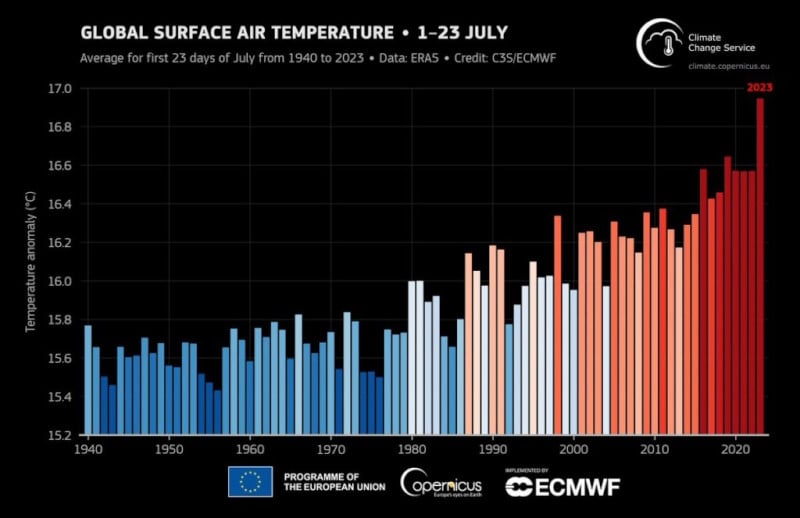
//
CJW: India's Internet Shutdown Means Manipur Is Burning in the Dark - at Wired
Indian authorities say that internet shutdowns like Manipur are done to preserve the peace, to stop misinformation spreading online and reassert control. Experts say they have the opposite effect. They allow impunity for crimes and for those who fail to pursue them. Had locals in Manipur been able to draw attention to the situation as it got out of control, the anarchy that followed might have been avoided. But the silence over the state meant the national government could feign ignorance. Human rights groups said they couldn’t collect evidence of violations or distribute them to colleagues overseas.
Some horrific scenes here. Important read if you’re not aware of what’s been happening under the Modi government.
//
On Tears of the Kingdom as ecofiction and the potential of games to explore ecological themes: Playing with Nature: On “Tears of the Kingdom” as Ecofiction by Martin Dolan at LARB (via Paul Graham Raven)
The War on Climate Activism Is Reaching Dangerous New Heights: Governments around the world are increasingly deploying the language and methods of counterterrorism to repress climate movements. - Darsen Hover at The Nation (via APH)
“There is alarming evidence that climate change both directly and indirectly impacts our sexual health, including due to increased gender-based violence or disruptions in sexual or reproductive services because of extreme weather. There also exists a body of writing on the logistics of climate change and sex: It’s getting hotter, so sex might become a more uncomfortable, sweatier affair. But a thornier question, perhaps, is to ask how intimacy is changing in the face of impending doom. How is desire affected when the world as we know it seems to be ending in front of our eyes?” The Climate Is Changing Everything—Including Our Sex Lives - Danzhu Hu • The New Republic
Just the headlines:
Thirsty Data Centers Are Making Hot Summers Even Scarier - Clara Hernanz Lizarraga, and Olivia Solon • Bloomberg
‘Facekinis’ become all the rage in China as temperatures soar • The Guardianc
Scientists Are Worried About Antarctica’s Unprecedented Lack of Sea Ice Growth - Brian Kahn • Bloomberg
France to offer cold hard cash to repair clothes instead of binning them - Hannah Bertolino at Dazed
Geopolitics & Empire
CJW: NATO’s Expansion Into Asia Is the Mother of Bad Ideas - Branko Marcetic at Jacobin
A war with China, even by proxy, would be incredibly destructive economically the world over — including for working Americans who, for all the official invective, rely on China as a major and growing trade partner. Militarily, a US-China war would be devastating for both countries, with even a recent war game that tips the United States to win forecasting massive losses on the US side, and warning of a “pyrrhic victory” where it would end up “suffering more in the long run than the ‘defeated’ Chinese.”
I love to see more warmongering coming from our elected officials even as they do little-to-nothing about the real danger of the coming decades (climate change, obvs).
//
CJW: Carnivals and Revolt - Josep Rafanell i Orra at Ill Will
We haven't finished with the Great Carnivals to come. After the sound and fury have passed, after the dead have been honored, after the flames and suffering subside, after time knocked off its hinges is once again returned to its dreary linearity, new forms of community will rise from the ashes of the social world. They're already there, blazing new trails. Everywhere, in our here and now, there are elsewheres [des ailleurs].
A great piece on the recent revolt in France, and the politics (or not) of revolt more generally.
Related: “There’s Nothing Left to Loot” - Djimi Diallo at Ill Will
The riots may be multi-racial (and they have been, in part, depending on the city), but the commitment of the rioters is a commitment to the destruction of the world in which racial categories are meaningful — sweeping away, alongside them, the organization of metropolitan space and the division of labor it structures. Their fires consume spaces that don't belong to us anyway — we're not at home in these dilapidated low-income housing projects, these schools that serve only to exclude us, these public transport systems that symbolize only our exploitation and shattered dreams, these police stations that only function to inflict violence on our bodies.
This piece is more philosophically tinged, and specifically about the racism and white supremacy in French (and broader Western) society that led to the revolt.
//
"So, the richest war machine in history, having scraped its cupboard bare, is now reduced to fielding a device of dubious military utility deemed illegal by over a hundred countries. That’s what we get for our $850 billion." - The $850 billion chicken comes home to roost - Andrew Cockburn at Responsible Statecraft
Just the headlines:
Wagner Group Disappeared and Executed Civilians in Mali - Nick Turse • The Intercept
Why the US “Rules-Based Order” Needs Rethinking - The Nation
A Pro-Putin Facebook Network Is Pumping French-Language Propaganda Into Africa - Cole Stangler • The Intercept
Tech & Design
CJW: What Is the Point of Threads, Zuckerberg’s ‘Twitter Killer’? - Rob Horning at Art Review
But simply by being a well-publicised version of what Twitter is believed to be, Threads undermines the potential of what it might have been – and intermittently was: a place where relevance was about power that could be accessed by a far broader range of people than earlier forms of media permitted. If Threads persuades a broad audience that microblogging is nothing more than text-driven TikTok or Instagram, it will have succeeded in trivialising the idea of public conversation, even if no one bothers to use it.
A short but interesting piece on Threads, its seeming quick demise, and the power it could have anyway to affect culture and undermine user power for the sake of The Platform.
//
CJW: Look at a stone - Rob Horning
An underlying implication [of LLMs] is language use is not free and unconstrained but predetermined and predictable; that is, the human use of language can be mathematically circumscribed, and ultimately proscribed. Language will be mechanically generated and circulated, and humans will be mechanistically affected by it without having the deluded notion of being able to change it or express themselves through it. Rather, language will articulate the capabilities of humans; it will program them like any other machine. In other words, language is not a medium for collective practice or the world spirit or moral freedom or the articulation of new concepts or the spontaneity of the human mind; it is instead an inefficient mask sitting over a complete and fully determined world, in which spontaneity and spirit are illusions.
The Horning double-feature continues. This piece is based on the notion that because LLMs have rendered language down into mathematics, widespread adoption means it could become a technology of repression and control (but also that human resistance and ingenuity would be a constant thorn in the side of would-be technoauthoritarians).
DCH: This is the bit that really stood out for me:
This suggests that the stakes are high for ideologizing AI — a lot depends on whether the imposition of generative AI is experienced as repressive or as convenient. If it seems convenient, data will presumably be less garbage-like and more useful for the purposes of social control. If it seems repressive, it will create a population intent on making more garbage. So the more that we can be convinced that AI is potentially useful and labor-saving, the more effective machine learning and surveillance will be at administrating an authoritarian society. And it may be that there is no middle ground — there are no “convenient” uses for generative models that don’t also augment its repressive possibilities. (Of course, I would argue that convenience simply is a form of repression, the sunny face of deskilling and disempowerment.)
Emphasis mine. This piece is primarily about the notion of how AI can empower digital dictatorships but as with everything Horning writes he scratches well below the surface to reveal deeper, often even more troubling, truths.
//
Just the headlines:
The World’s Last Internet Cafes • Restofworld
Fake Russian influencers are going viral on Chinese social media - Caiwei Chen • restofworld.org
Sam Bankman-Fried wanted to buy the nation of Nauru to wait out the world's end - Faustine Ngila • Quartz
The ChatGPT revolution is another tech fantasy - Paris Marx • disconnect
Meta’s Reality Labs has now lost more than $21 billion since the beginning of last year - Jonathan Vanian • CNBC
Is Airbnb crashing or not? It depends on what data you look at - Chris Morris • Fast Company (DCH: Sure hope so.)
"They need us. We don't need them:" The fall of Twitter is making the trolls and grifters desperate - Amanda Marcotte • Salon
Society & The Culture
CJW: From Churches to Lifehouses - Adam Greenfield at Verso (via Inhabit)
[...] local communities should assume control over underutilized churches, and convert them to Lifehouses, facilities designed to help people ride out not merely the depredations of neoliberal austerity, but the still-harsher circumstances they face in what I call the Long Emergency, the extended period of climatic chaos we've now entered. This means fitting them out as decentralized shelters for the unhoused, storehouses for emergency food stocks (rotated through an attached food bank), heating and cooling centers for the physically vulnerable, and distributed water-purification, power-generation and urban-agriculture sites capable of supporting the neighborhood around them when the ordinary sources of supply become unreliable. The fundamental idea of the Lifehouse is that there should be a place in every three-to-four city-block radius where you can charge your phone when the power’s down everywhere else, draw drinking water when the supply from the mains is for whatever reason untrustworthy, gather with your neighbors to discuss and deliberate over matters of common concern, organize reliable childcare, borrow tools it doesn’t make sense for any one household to own individually, and so on — and that these can and should be one and the same place. As a foundation for collective resourcefulness, the Lifehouse is a practical implementation of solarpunk values, and it’s eminently doable.
It's depressing to think that Lifehouses could become such fundamental community infrastructure precisely because Capital has captured and gutted or undermined so much of what we need as a society, but at the same time, if the State is going to abandon us (as it seems dedicated to doing) then these forms of mutual aid will be necessary. Not to mention that the community building aspects alone could be incredibly helpful in these times of continued fragmentation and "organised abandonment".
//
CJW: Almost All Research on the Mind Is in English. That’s a Problem - Sofia Quaglia at Wired
The way sentences are constructed correlates with where the focus of attention falls in scenes as they unfold. For instance, there are cross-linguistic differences in how people use grammar to talk about accidental events. In English, it is typical to give an “agentive” description, such as “Sofia broke the glass,” even if it was an accident. But in Spanish, the particle se is typically used, and this changes the focus of the sentence; the description of the same event in Spanish would often be formed as: “The glass broke itself.”
I think the language-cognition connection is obvious, but I was still interested on the specifics and examples given in this piece. It's something I'd love a full book on (presumably when more research has been done), and would be great research fodder for sci-fi. I've always been annoyed by aliens in SF that speak and behave in very human ways. In fact, one of the reasons I haven't written aliens in my fiction is because I would want them to be truly alien (while also recognising that might be actually impossible to render in language). I actually wanted to explore a shift from a human (or specifically an English-speaker's) perspective into something else, coinciding with physiological changes, but that was to be in the sequel to a now-trunked book. I'm sure I'll find another time/way to explore that.
//
CJW: Unlimited Hangout - The UFO Story
The streak across the night sky is probably a spy satellite. But we are not allowed to know. The light trails documented in these pictures are registered orbiters with classified identity. These ‘real’ UFOs are probably spy satellites and are being tracked like all of the objects in Earth’s orbit to avoid collision, but we can’t know for certain. Their existence is a form of dominance. The secrecy forces others to evaluate and take a reactive stance.
A wide-ranging piece covering the historical development of UFO folklore, US intelligence manipulations of said folklore and ufological groups, and other facets about the un/reality of UFOs.
//
“His death has hit New York’s LGBTQ+ community particularly hard at a time when harassment and violence against queer people in the US is increasing at an alarming rate. It’s not incidental that, prior to his death, Silbey was voguing – a style of dance heavily associated with Black queer and trans culture which has, for decades, been a symbol of pride and resistance.” Beyoncé honours O’Shae Sibley, the dancer killed for voguing to her music | Dazed
Just the headlines:
The Online Christian Counterinsurgency Against Sex Workers - Sam Biddle and Jack Poulson • The Intercept
Desperate Chinese parents are joining dating apps to marry off their adult children - Viola Zhou • Rest of World. (DCH: is it possible that Chinese tech bros are even more cringe than their SV counterparts?)
Health, Cooking, and Related
Just the headlines:
Fatigue Can Shatter a Person - Ed Yong • The Atlantic (DCH: Ed Yong has been one of the best journalists covering Covid and this is his last article on the subject at The Atlantic. Read it. Learn from it.)
One More COVID Summer? - Katherine J. Wu • The Atlantic
Leprosy May Be Endemic in Central Florida, Scientists Report - Apoorva Mandavilli • The New York Times
Labour & Economics
RAND corporation has authored a paper that pegs the amount of wealth extraction perpetuated against the bottom 90% of Americans by the ultra rich at 47 trillion dollars. Ain’t nothing free about the free market. The Big Myth About “Free” Markets That Justified History’s Greatest Heist - Jon Schwarz • The Intercept
“At the end of the day, I just want my fellow eager viewers to remember that when a toy company signs off on a toy movie, it can only be because they knew it would help them sell toys. Have fun, wear pink (I’m planning to). Just keep in mind that Barbie has already made $150 million opening weekend. That doesn’t mean it can’t strike a nerve, but it will never have the nerve to call for a strike.” Barbie's Capitalist Critique Will Make BlackRock Millions - Lindsay Lee Wallace • bloodknife
Just the headlines:
As Actors Strike for AI Protections, Netflix Lists $900,000 AI Job - Ken Klippenstein • The Intercept
Will There Be Bananas Under Socialism? - Eric Levitz • New York Magazine
As EVs surge, so does nickel mining’s death toll - Ayomi Amindoni • restofworld
The Workers Behind AI Rarely See Its Rewards. This Indian Startup Wants to Fix That - Billy Perrigo • Time
Books
CJW: Tell Me I'm Worthless by Alison Rumfitt
This book is brilliant, brutal, and incisive. It’s unflinching horror that speaks to our current moment and the rise of fascism with a specifically trans focus, but insights that speak to broader politics of division. That all said, it’s also a personal and human story, based in the relationship and rift between the two main characters that it never comes across as polemical, which is a trap I could easily see a lesser writer fall into when trying to cover the same issues.
It’s affecting, haunting, fucked up, and if anything in the above sounds interesting, you should track it down. There’s a well-deserved content warning though for rape, transphobia, racism, antisemitism and more though, so just be forewarned.
//
LZ: On Ugliness, by Umberto Eco
Great read for those who like art history and semiotics. The book goes back to pre-medieval times and reaches the beginning of this century in an attempt to understand what ugliness means throughout history. Spoiler alert: it has a lot to do with representations of evil, diseases and death. Not so much of a spoiler though, right? But it was surprising to me to see how certain art movements were kind of “cyclical” in terms of what their interest was – like decadentism and baroque, for example. However, the more contemporary it gets the more cringey it goes as Eco is not really a subcultures specialist, so you will see punks and goths portrayed as manifestations of ugliness – which makes sense, if you consider classic or mainstream beauty, but then again if you go back to romanticism and Victorian times, there’s a lot of connection there.
Movies + TV
LZ: Barbienheimer
So I took one Saturday to watch both films, first Barbie and then Oppenheimer. I was surprised that I cried so often while watching Greta Gerwig’s take on feminism and nostalgia. Well, it should have been obvious that the director of Ladybird would do something like this, but it just resonated so much with me – especially when you see the relationship between mother and daughter and the “awakening” of stereotypical Barbie (aka Margot Robbie).
On the other hand, Oppenheimer was a little bit underwhelming. Maybe the hype made me expect that I would shit my pants off when the bomb exploded, but it just didn’t happen. This time Florence Pugh couldn’t save much as she was barely there. I’m not saying it’s bad, it’s Nolan, it can’t be really bad, but I expected more. The good thing is that the film doesn’t feel like it takes 3 hours – maybe by the end of it, yes, when you get to the more political, bureaucratic part of it, but it was a fairly well spent time.
MJW: I only Barbied, mostly because sitting still for three hours straight is a bridge too far for me - I’d prefer to Oppenheim when I’m able to pause. I went with my bestie and her thirteen year old daughter to see it at the drive-in. I don’t spend a lot of time around The Youth, so it was interesting to see what she thought of it, and how much it hit and missed.
I wasn’t expecting it to be a film about Ken almost as much as it was about Barbie, and how the patriarchy hurts us all.
Comics
CJW: Boys Weekend by Mattie Lubchansky
I’ve been aware of Mattie Lubchansky and their work for a while now - they used to be the editor of, and a contributor to, The Nib, and they’ve appeared a number of times on the Trash Future podcast. As far as I’m aware though, Boys Weekend is their first long-form comics work - it’s an anti-tech satire as much as it’s a heart-felt story about transition, acceptance and (more importantly) self-acceptance. It’s also fun, funny, and clever as hell.
Music
LZ: Kuupyr - Taikus
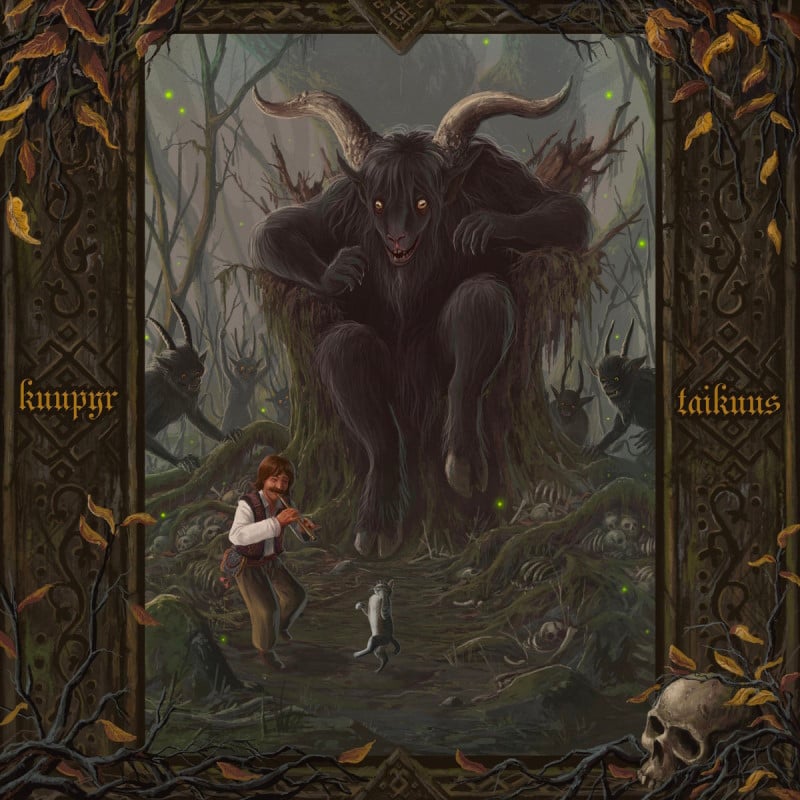
I was first seduced by the album cover, which is like a dark(er) version of the Hamelin’s flautist but with a dancing tabby cat surrounded by goat demons and other hellish creatures. And though the band uses Finnish words, it’s actually from the US. Nevertheless, good black metal.
//
LZ: Urban black metal, anyone?
So I was just followed by this American band Urbain that describes itself as “pioneers of urban black metal” and I was wondering what the hell! Turns out this is no new discussion, but someone already wrote about that in 2011 and how a new breed of BM was (and still is) moving from the ambiance of forests and fjords and Scandinavian vibes to a more urban, perhaps Americanized and even capitalist dystopian site. Sounds pretty much like anything coming from the US imho and from other discussions on Rate Your Music, people have already qualified Altar of Plagues as a urban BM band, but also Amesoeurs (which is French and I suppose it’s due to their album covers) and Lantlos (which is German and I have no idea why they associated it with UBM). In any case, one more thing to keep an eye on and it makes me wonder how art and history is indeed cyclic. I’m finishing Eco’s On Ugliness and he mentions Decadentism and Modernism as these movements that praised or at least addressed the ugliness of modern cities and technology in response to classical ideals of beauty. Whereas classic black metal praises the ominous beauty of wintry forests, urban black metal distils its hatred from metropolises.
//
LZ: Taint/Grunt - Backyard bruises
If you like oldschool industrial music like Throbbing Gristle and Nurse With a Wound, but also black metal, try this one. Love the contrast between the cover art and even the name of the album and the actual music they make.
Art
LZ - Hammershøi

More recently I learned about this Danish painter who is known for his melancholic portrayals of daily life in Scandinavia. It’s interesting because living in Sweden is not the same as living in Germany or Portugal when it comes to the experience of finding historic buildings and feeling like you are back to medieval times. Most of the cities are modern and fairly technological, but Hammershøi captures this other side. Here the old houses are not quite like English manors you would imagine by reading gothic novels, but light and white-washed open spaces with few decor items and yet a sense of sadness and loneliness that don’t make you bad or claustrophobic, but in that right mood of sadness + comfort. Is it melancholia? I think so.
The Memes

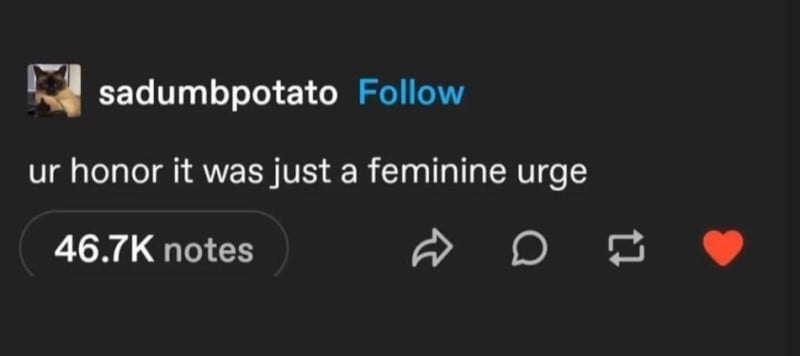

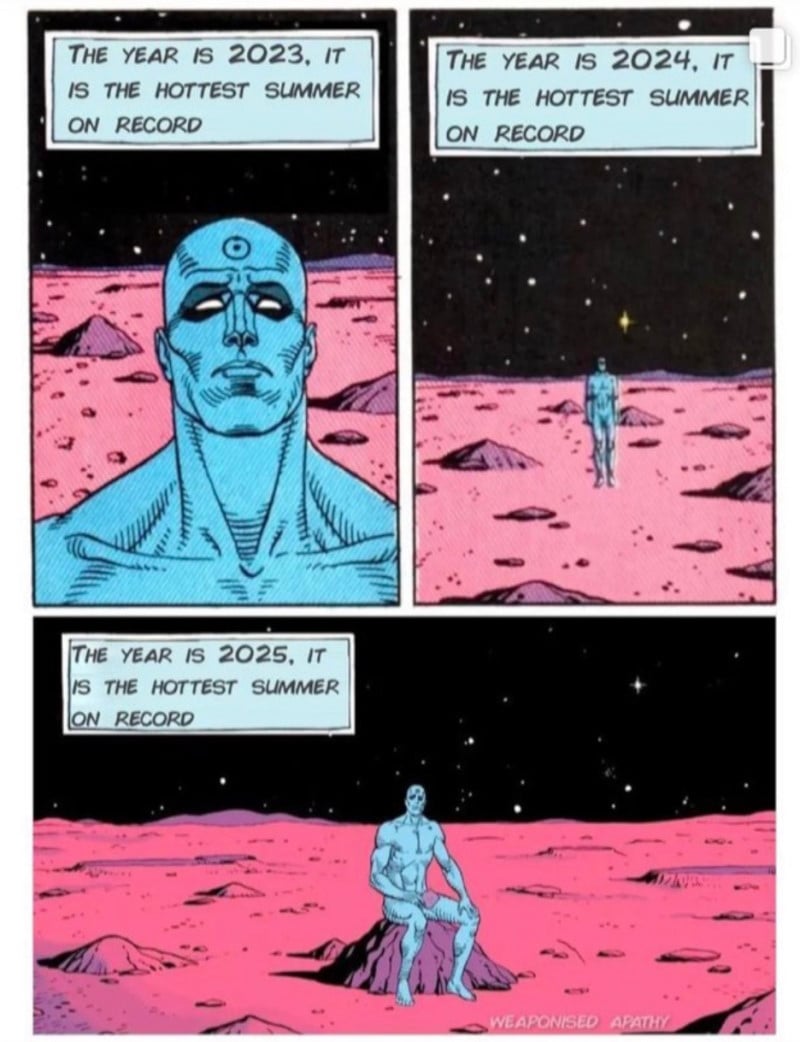

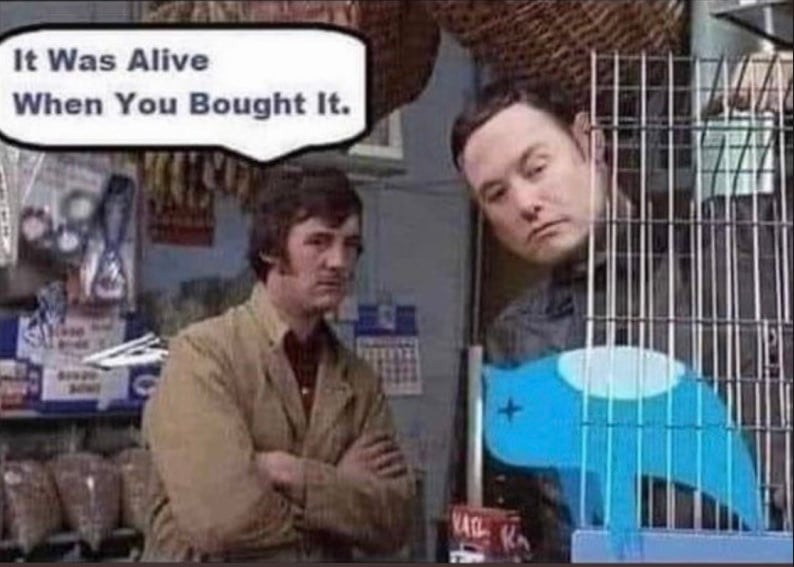
You just read issue #228 of Nothing Here. You can also browse the full archives of this newsletter.